[1] Sister Massimiliana: yours is a religious congregation of women of the Byzantine rite, founded by Father Giuseppe Alloatti. You are in Sofia, Bulgaria. Can you give us a brief summary of your history?
We are the Eucharistic Sisters, a religious congregation of the Byzantine-Slavic rite and we are happy to be part of the great Vincentian Family. At the moment we are in Bulgaria, where the General House is located, and we also minister in North Macedonia.
Our congregation was founded in 1889, on the borders of Bulgaria, in Thessalonica. At that time, the main city of Macedonia was still part of the Ottoman Empire. Also, the Bulgarian Orthodox Church was under the rule of the Greek Orthodox Church.
A few years earlier, a young missionary from the Congregation of the Mission, newly consecrated, was sent to help his brothers in their mission in Thessalonica. That missionary was Father Giuseppe Alloatti, who was proclaimed Servant of God on June 16. Born in Villastellone, he spent his childhood and youth in Turin, known as the city of the Blessed Sacrament. In Thessalonica he found a poor town and church, where the faithful and the clergy had no religious formation. It was a difficult time, after the union of the Bulgarian Orthodox Church with Rome in 1860, those who remained faithful to this union encountered many obstacles. Father Alloatti suffered greatly due to the ignorance of the people and the clergy regarding the Holy Eucharist. There were no tabernacles in the churches … in fact he found the Holy Eucharist preserved in matchboxes, placed in a hole in the wall. He wept in pain when he saw how people attended Mass and how communion was received without any religious respect…
Like any religious founder, many things could be said about him, but I will limit myself to what is related to the founding of our congregation. In the situation he was in, Father Alloatti used the safest weapons: prayer and sacrifice. He prayed day and night. He sought God’s enlightenment with regard to the manner to help people. One day, while making the Way of the Cross, he stopped for more than an hour at the Fourth Station (where Jesus meets his Mother) … and there he clearly understood that he should found a congregation of Sisters consecrated to Jesus in the sacrament of the Eucharist and that this congregation should be placed under the protection of the Blessed Virgin. The Sistrs would be called Eucharistic Sisters and the first superior would be his own sister, Eurosia. Through various means they would educate women and girls in the faith and help them to know, love and adore Jesus present in the Eucharist.
Father Alloatti found support from his superior. Almost three years passed… After a novena to Mary Help of Christians, Don Bosco called Eurosia and said: “You have asked the Virgin for an answer. She gives it to you through me. You must go help your brother. “. The answer was clear. Shortly after, she left Turin and arrived in Thessaloniki. After a year of preparation with the Daughters of Charity, on Holy Thursday, April 18, 1889, Eurosia and four other girls started a new congregation. The foundation was held on April 21, Easter Dunday, which that year coincided for Catholics and Orthodox. Perhaps that was not by chance since the objective of the new congregation was the unity of the Church, which can only be possible when everyone has approached Jesus in the Eucharist.
The number of Sisters soon increased. They worked in parishes and cared for poor churches, so that everything and everyone would be worthy of their beloved Jesus, present in the Eucharist. They formed groups with girls and women and instructed them in their faith and thus, helping them to know, love and worship Jesus in the sacrament of the Eucharist. At the same time, they were concerned with the human and cultural formation of children, youth and families. They opened an orphanage and as one war followed another, the number of orphans increased. After the two Balkan wars and World War I, Bulgaria’s borders changed and the Sisters were forced to flee from one place to another with the girls. In August 1920, together with Father Alloatti, they arrived in Sofia. There they found a place of hope and, despite the difficulties, the founder and the Sisters not only organized their lives, but also helped all the refugees who had come there from Macedonia and Thrace. A monastery house and orphanage for sisters and girls were built, as well as a church for Byzantine-Slavic refugees. Today, this has become the Cathedral of the same rite. At that time, Sister Eurosia Alloatti was in Italy due to illness, and on December 20 of the same year she left for the House of the Lord. Led by Father Alloatti, and with the support of Princess Eudokia, the sisters worked with all their hearts and with all their might on behalf of the children entrusted to them and on behalf of all the faithful.
In 1925, Bishop Angelo Giuseppe Roncalli – today Saint John XXIII – arrived in Sofia as an apostolic legate. Along with Father Alloatti, he did mcuh for the Byzantine-Slavic Rite Church. After Father Alloatti’s departure to Turin, also for health reasons, Bishop Roncalli became a true spiritual father of the Sisters. It was a period of development for the congregation. There were vocations, new houses were opened throughout Bulgaria where there were groups of Catholics of the Byzantine-Slavic rite. But this did not last long. World War II changed everything.
In 1944 an atheistic communist regime was established in Bulgaria. The persecution of the Church began. All foreign congregations were expelled; church property was confiscated; Bulgarian priests were convicted as Vatican spies and sent to prison or fields. Two of our nuns and a Carmelite nun were also convicted. We, on the other hand, were recognized by the communist government as a Bulgarian congregation and we were able to continue living and wearing the religious habit, a right that was not grated to Bulgarians belonging to a foreign congregation. But the orphanage – where almost a hundred girls lived – and the monastery were confiscated. We moved to a small house, where we would stay for over thirty years. It was a long period of presence and testimony, but without any activity. Nothing was allowed, not even contact with children, youth or families. Hidden paths were sought, with great confidence in the Lord. It was a long period of silent presence, similar to that of the Eucharist: of witness and prayer.
The years passed and, like any regime, communism collapsed. In 1989 there were political changes. Now, as a Catholic Church in Bulgaria, we enjoy some freedom, but the consequences of harsh atheism are still noticeable. We have a new monastery and a beautiful church, consecrated to Saint John XXIII. We thank the Lord for the new vocations, which are few but priceless. Jesus in the Eucharist remains unknown, poor and abandoned in churches and souls. For our part, like Mary, we continue to love Jesus and like Marta we continue to serve him in churches and souls, so that young and old might know him, love him, serve and worship Him, the Lord truly present among us under the species of the Eucharist. We dedicate our lives in order to achieve this goal: we work in parishes, we organize prayer groups, we take care of churches. We take care of girls and young people with difficulties and help them continue their studies. Thanks to benefactors, we have spent years distributing lunch to the poor every day. We also distribute much humanitarian aid, which we started receiving from the first moment of political change (in recent years, however, we have received less). In Sofia, in the courtyard of the monastery, we opened a medical center, accessible to everyone, but thanks to benefactors we can especially treat the poor. We try to help in various ways all the homeless. In this way we serve our beloved Jesus in the Eucharist, to bring everyone closer to Him.
[2] What is the relationship between your religious congregation and the Vincentian Family? What is the role of charity in your congregation?
Our founder, Father Giuseppe Alloatti, was a member of the Congregation of the Mission, and we, as a Congregation, were born into Vincentian spirituality. Our first superior and co-founder, Sister Eurosia Alloatti, made her novitiate and preparation as a religious with the Daughters of Charity. Our first Rule was that of the Daughters of Charity, (with some modifications as a result of our Eucharistic charism). Father Alloatti wrote that the Eucharistic Sisters are to the Orientals what the Daughters of Charity are to Westerners, with the difference that the Daughters of Charity love, worship and serve Jesus hidden in the suffering bodies of the poor, while the Eucharistic Sisters love, adore and serve Jesus, the hidden Eucharist, poor and abandoned in churches and souls.
As a result of this bond, we came into existence with this spirituality of charity. Father Alloatti, who came to our country, found the poorest of the poor: he found Jesus the Eucharist, unknown, poor and abandoned in the misery of the churches and in the religious ignorance of the clergy and the faithful. He was the first to dedicate his whole life to teaching the first sisters how to use all available means to serve the poor, materially and spiritually, to bring them closer to Jesus in the Eucharist and help them to know, love, worship and serve this little-known God, hidden under the species of Bread and Wine.
[3] More specifically, how do you translate the centrality of the Eucharist into your mission and how do you translate the prayer of adoration into your life translated?
According to the charism received from Father Alloatti, our whole life must move forward from the Eucharist. He wrote to us: Jesus, not content with hiding under the simple species of the Eucharist, wants to hide also under the human species of the Eucharistic. He also told us that the foundation of our life must be contemplation. In light of this, our first duty is to remain close to Jesus in the Eucharist: to know him, love him, adore him and then, filled with him, we take him to others, so that they too may know him, love him, adore him and serve him. Our mission is to take care of the poor churches, so that everything is worthy of Jesus in the Eucharist. We make use of all means in order to serve others so that all might know him, love him, serve him and adore him in spirit and in truth.
[4] How has COVID impacted your Congregation? what initiatives have you taken?
It has been a difficult time that continues to the present-day. We have not been an exception. Earlier this year, four of the younger sisters fell ill with COVID, one after another, and this created isolated among ourselves and then we became isolated from the people. But this also had a positive side. This isolation allowed us to remain more silent and in union with the Lord, and to experience God’s presence as we prayed for each other and for all people. We experienced the affection and a oneness with all who helped us during out time of need. The whole Church prayed for us. Our poor were also not abandoned. Caritas continued to distribute lunch to the people who gathered in our yard. We also experienced the pain of COVID when two of our Sisters in Northern Macedonia died. When the storm passed and it was possible to continue our lives again, we tried to do everything calmly and, with great confidence in the Lord, to help people in need … and to help them morally during these difficult days. We use all possible means to reach people: the telephone to contact the elderly and the Internet (virtual gatherings) to deal with religious issues as well as for catechesis and for meetings.
Once a week, in the courtyard, we organize a moment of common prayer and speak a few words about the life of Jesus to those who come to eat. Despite the cold, they are happy and looking forward to this time for reflection. Some have begun to come to Sunday Eucharist. We carry all of this in our hearts and continually offer it to the mercy of God.
[5] Two years have passed since the meeting in Rome with the branches of the Vincentian Family. What has remained with you from from those days?
Those were unforgettable days! I can say that I remember almost everything and I remember it with great joy and gratitude. I remember so many people and faces. I remember the meetings, the many testimonies, the group work, the breaks, the liturgical moments, the Audience with Pope Francis, the last meeting and the song of Saint Vincent that Gen Verde offered us, the last Mass! Everything, everything! It was like being with family.
Here I would like to add that, with the establishment of the communist regime in Bulgaria, all contact with the western world and the Catholic Church became impossible and dangerous. Religious publications were prohibited and nothing could be brought here from outside. We were behind the Iron Curtain. I was born during that era. Through the grace of God, I entered the monastery in this period, but that was almost twenty years after the last woman who entered. Another twenty years would pass before another young woman would enter. It was a difficult time. We could not speak about what united us with other congregations: the walls were said to have ears. And it was true, there were microphones. When I read our founder’s lectures and heard people speak about Saint Vincent, I did not know who he was … I knew nothing about him.
After the political changes in Bulgaria, in the 1990’s, we began the work of renewing our Rules and brining them into accord with the demands of the Second Vatican Council. All the manuscripts of our Founder came to light and we began to speak about the spirituality of Saint Vincent. At that time, our Superior General, Sister Agnes Slavovska, wrote a letter to the Superior General of the Congregation of the Mission, Father Gregory Gay, asking him to welcome our congregation into the Vincentian Family. The response was positive and on two occasions his vicar, Father Józef Kapuściak, visited us. I will never forget the joy and affection with which we all welcomed him, but especially the Sisters who remembered them from years past when contact became possible. Later, God allowed Father Tomaž Mavrič to meet “by chance” with our Bishop, Christo Proykov, and a group of our younger Sisters (this took place during the 2016 Krakow World Youth Day). That contact was renewed and deepened in 2017 with two of the younger Sisters participated in the 400th anniversary Symposium of the Vincentian Family (Rome). That experience greatly enriched all of us! The following year I was invited several times by Father Tomaž to take part in several event, especially on the occasion of the opening of the Cause of Beatification and Canonization of our Founder and his confrere, Father Giuseppe Alloatti. The highlight, of course, was the meeting of the Worldwide Vincentian Family that was held in January 2020. There are no words to express that experience. I often looked at everyone around me, thought that our congregation was like a lost girl who had found her family, and thanked the Lord. Now I can say, like old Simeon: “Now you can let your servant go in peace, Lord…”. Yes, we are not alone. The new generation of Eucharistic Sisters has its own great Vincentian Family. We are a small congregation but we are living our charism with authenticity and we want to continue be a gift for the entire Vincentian Family.
[6] What do you believe is the challenge with regard to the future for your congregation?
We live in a very secularized world far in which people find themselves distanced from God. At the same time, there are many who are searching for God. Jesus is present in the Eucharist is and will always remain unknown, or little known, poor and abandoned. Following the example of our Founders, we must faithfully live our consecrated life according to our charism. We must bring God to all and bring everyone closer to God. Only in Jesus can his priestly prayer be fulfilled, that all might be one!
Sofía, December 13, 2021
Elena Grazini
- Fr. Giuseppe Alloatti – after changing rite.
- Sr Eurosia Alloatti
- P. Giuseppe Alloatti – after changing rite.
- The community
- Eucharistic Adoration
- On vacation with children
- Corpus Christi Procession
- Procession with Our Lady of Fatima
- Lunch distribution
- Christmas 2020 Feast with the poor
- Cracow – Father Tomaž Mavrič with our Bishop Christo Proykov and the young sisters.



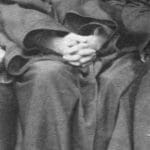
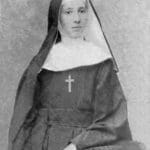
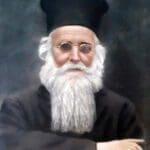
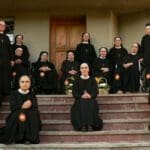
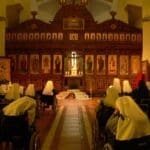
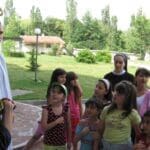

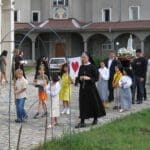
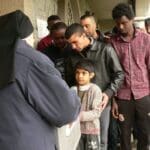
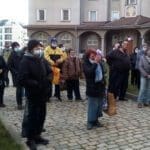
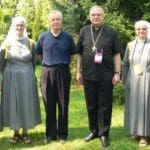




An amazing faith in the Church and God working. We pray for a civil world for all to live in peace.